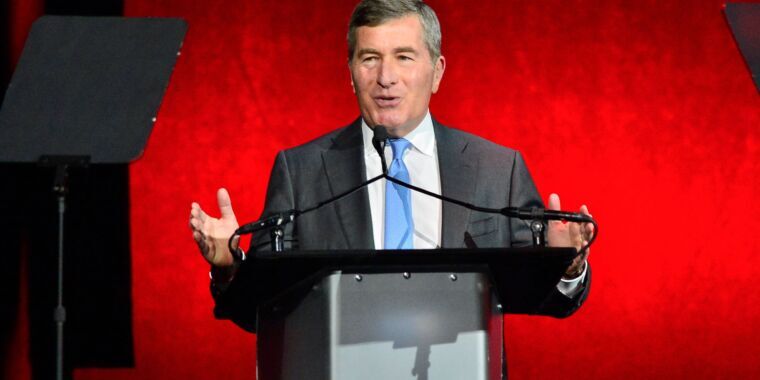**Opponents say SOPA-like proposal would block plenty of legitimate websites.**Motion Picture Association CEO Charles Rivkin yesterday said his group plans a major push to impose a site-blocking law in the US. The MPA will “work with members of Congress” to require Internet service providers to block piracy websites, he said during a “state of the industry” address at CinemaCon 2024 in Las Vegas, a convention for movie theater owners.
“This danger [of piracy] continues to evolve, and so must our strategy to defeat it,” Rivkin said. “So today, here with you at CinemaCon, I’m announcing the next major phase of this effort: the MPA is going to work with members of Congress to enact judicial site-blocking legislation here in the United States.”
A site-blocking law would let copyright owners “request, in court, that Internet service providers block access to websites dedicated to sharing illegal, stolen content,” he said. Rivkin claimed that in the US, piracy “steals hundreds of thousands of jobs from workers and tens of billions of dollars from our economy, including more than one billion in theatrical ticket sales.”…
Lawful content would be blocked, group warns
Consumer advocacy group Public Knowledge urged Congress to reject the MPA push, saying that a site-blocking law would threaten the open Internet. “With today’s announcement, the MPA has made its intentions crystal clear: It wants to give itself and its members the power to force any Internet infrastructure provider, up to and including the broadband providers that service your home, to cut off access to websites on their say-so alone,” said Meredith Rose, the group’s senior policy counsel.
The MPA’s latest push for a site-blocking law comes about two weeks before a Federal Communications Commission vote to restore net neutrality rules that prohibit ISPs from blocking and throttling websites. The proposed net neutrality rules apply only to lawful content, but opponents of site-blocking legislation fear a blocking law would undermine the goals of net neutrality by compelling ISPs to block both lawful and unlawful content.
Rose said the MPA’s requested law would be similar to the proposed Stop Online Piracy Act (SOPA) that was shelved after major protests over a decade ago.
Via @glass0048
The perpetrators are real-life mobsters, organized crime syndicates—many of whom engage in child pornography, prostitution, drug trafficking, and other societal ills.
Sounds more like he is talking about the motion picture industry itself.
They operate websites that draw in millions of unsuspecting viewers whose personal data can then fall prey to malware and hackers.
Funny, when people use those websites, they often use a VPN to hide their identity from the government and organizations exactly like the one this stooge represents.
You wouldn’t download a car.
It’s weird, if they at least appealed to respect for creatives or something it would be more sympathetic but they always choose these really weird rhetorical directions.
Piracy is their only real competitor.
This is the best summary I could come up with:
The MPA will “work with members of Congress” to require Internet service providers to block piracy websites, he said during a “state of the industry” address at CinemaCon 2024 in Las Vegas, a convention for movie theater owners.
“So today, here with you at CinemaCon, I’m announcing the next major phase of this effort: the MPA is going to work with members of Congress to enact judicial site-blocking legislation here in the United States.”
A site-blocking law would let copyright owners “request, in court, that Internet service providers block access to websites dedicated to sharing illegal, stolen content,” he said.
Consumer advocacy group Public Knowledge urged Congress to reject the MPA push, saying that a site-blocking law would threaten the open Internet.
The MPA’s latest push for a site-blocking law comes about two weeks before a Federal Communications Commission vote to restore net neutrality rules that prohibit ISPs from blocking and throttling websites.
Rose said the MPA’s requested law would be similar to the proposed Stop Online Piracy Act (SOPA) that was shelved after major protests over a decade ago.
The original article contains 489 words, the summary contains 180 words. Saved 63%. I’m a bot and I’m open source!
Cool. Start with Spotify.
@brianstorms good point!!





